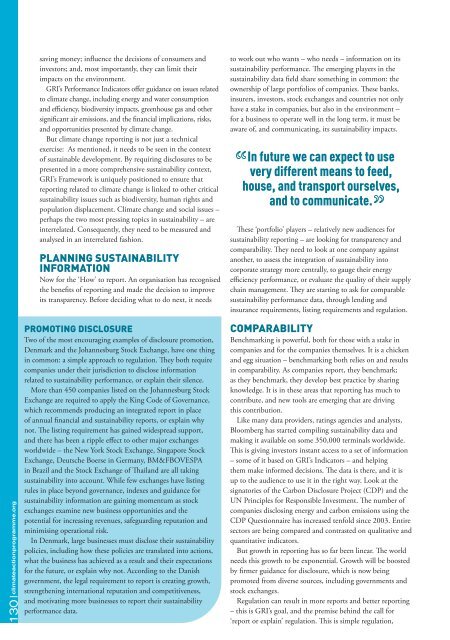Climate Action 2011-2012
Create successful ePaper yourself
Turn your PDF publications into a flip-book with our unique Google optimized e-Paper software.
saving money; influence the decisions of consumers and<br />
investors; and, most importantly, they can limit their<br />
impacts on the environment.<br />
GRI’s Performance Indicators offer guidance on issues related<br />
to climate change, including energy and water consumption<br />
and efficiency, biodiversity impacts, greenhouse gas and other<br />
significant air emissions, and the financial implications, risks,<br />
and opportunities presented by climate change.<br />
But climate change reporting is not just a technical<br />
exercise: As mentioned, it needs to be seen in the context<br />
of sustainable development. By requiring disclosures to be<br />
presented in a more comprehensive sustainability context,<br />
GRI’s Framework is uniquely positioned to ensure that<br />
reporting related to climate change is linked to other critical<br />
sustainability issues such as biodiversity, human rights and<br />
population displacement. <strong>Climate</strong> change and social issues –<br />
perhaps the two most pressing topics in sustainability – are<br />
interrelated. Consequently, they need to be measured and<br />
analysed in an interrelated fashion.<br />
plAnning SuStAinAbility<br />
infoRmAtion<br />
Now for the ‘How’ to report. An organisation has recognised<br />
the benefits of reporting and made the decision to improve<br />
its transparency. Before deciding what to do next, it needs<br />
to work out who wants – who needs – information on its<br />
sustainability performance. The emerging players in the<br />
sustainability data field share something in common: the<br />
ownership of large portfolios of companies. These banks,<br />
insurers, investors, stock exchanges and countries not only<br />
have a stake in companies, but also in the environment –<br />
for a business to operate well in the long term, it must be<br />
aware of, and communicating, its sustainability impacts.<br />
In future we can expect to use<br />
very different means to feed,<br />
house, and transport ourselves,<br />
and to communicate.<br />
These ‘portfolio’ players – relatively new audiences for<br />
sustainability reporting – are looking for transparency and<br />
comparability. They need to look at one company against<br />
another, to assess the integration of sustainability into<br />
corporate strategy more centrally, to gauge their energy<br />
efficiency performance, or evaluate the quality of their supply<br />
chain management. They are starting to ask for comparable<br />
sustainability performance data, through lending and<br />
insurance requirements, listing requirements and regulation.<br />
130 climateactionprogramme.org<br />
pRomoting diScloSuRe<br />
Two of the most encouraging examples of disclosure promotion,<br />
Denmark and the Johannesburg Stock Exchange, have one thing<br />
in common: a simple approach to regulation. They both require<br />
companies under their jurisdiction to disclose information<br />
related to sustainability performance, or explain their silence.<br />
More than 450 companies listed on the Johannesburg Stock<br />
Exchange are required to apply the King Code of Governance,<br />
which recommends producing an integrated report in place<br />
of annual financial and sustainability reports, or explain why<br />
not. The listing requirement has gained widespread support,<br />
and there has been a ripple effect to other major exchanges<br />
worldwide – the New York Stock Exchange, Singapore Stock<br />
Exchange, Deutsche Boerse in Germany, BM&FBOVESPA<br />
in Brazil and the Stock Exchange of Thailand are all taking<br />
sustainability into account. While few exchanges have listing<br />
rules in place beyond governance, indexes and guidance for<br />
sustainability information are gaining momentum as stock<br />
exchanges examine new business opportunities and the<br />
potential for increasing revenues, safeguarding reputation and<br />
minimising operational risk.<br />
In Denmark, large businesses must disclose their sustainability<br />
policies, including how these policies are translated into actions,<br />
what the business has achieved as a result and their expectations<br />
for the future, or explain why not. According to the Danish<br />
government, the legal requirement to report is creating growth,<br />
strengthening international reputation and competitiveness,<br />
and motivating more businesses to report their sustainability<br />
performance data.<br />
compARAbility<br />
Benchmarking is powerful, both for those with a stake in<br />
companies and for the companies themselves. It is a chicken<br />
and egg situation – benchmarking both relies on and results<br />
in comparability. As companies report, they benchmark;<br />
as they benchmark, they develop best practice by sharing<br />
knowledge. It is in these areas that reporting has much to<br />
contribute, and new tools are emerging that are driving<br />
this contribution.<br />
Like many data providers, ratings agencies and analysts,<br />
Bloomberg has started compiling sustainability data and<br />
making it available on some 350,000 terminals worldwide.<br />
This is giving investors instant access to a set of information<br />
– some of it based on GRI’s Indicators – and helping<br />
them make informed decisions. The data is there, and it is<br />
up to the audience to use it in the right way. Look at the<br />
signatories of the Carbon Disclosure Project (CDP) and the<br />
UN Principles for Responsible Investment. The number of<br />
companies disclosing energy and carbon emissions using the<br />
CDP Questionnaire has increased tenfold since 2003. Entire<br />
sectors are being compared and contrasted on qualitative and<br />
quantitative indicators.<br />
But growth in reporting has so far been linear. The world<br />
needs this growth to be exponential. Growth will be boosted<br />
by firmer guidance for disclosure, which is now being<br />
promoted from diverse sources, including governments and<br />
stock exchanges.<br />
Regulation can result in more reports and better reporting<br />
– this is GRI’s goal, and the premise behind the call for<br />
‘report or explain’ regulation. This is simple regulation,












